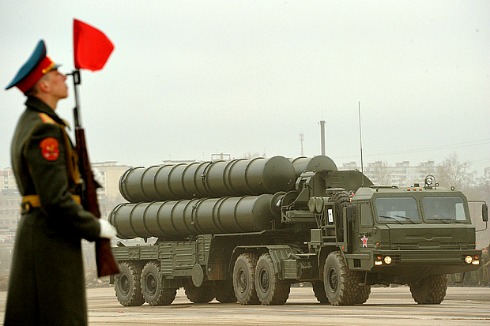Archives
AND MORE...

And The Beat Goes On...
_____________________

Shalom From Iran!
_____________________
Welcome To Missile Town
_____________________

Surprise, Surprise
_____________________

IF Iran Cheats
_____________________

An Historic Farce
_____________________
April 11, 2016
Opening The Floodgates
On Monday, Iran’s Tasnim news agency reported that Iran received the first shipment of Russian S-300 long-range surface-to-air missiles (see first piece below).
The sale of these missiles, originally conducted in 2007, had been repeatedly delayed because of UN nuclear sanctions banning their delivery to Iran, but Russian President Vladimir Putin lifted the ban last year when world powers and Iran reached an interim deal supposedly curbing Iran's nuclear ambitions.
Since then, there has been great concern over the impending shipments, given the advanced system's ability to shoot down missiles as well as jets, but the US and other Western powers have done nothing to stop it. BTW, it’s even been reported that Iran was expected to receive the latest version of this weapon, the S-300V4, a significant improvement on the original ordered by Tehran.
Nevertheless, Iran’s recent tests of ballistic missiles have managed to elicit response, albeit a tepid one, from the powers that be in DC. Secretary of State John Kerry spoke last week about offering Iran some new arrangement, in light of its recent provocative ballistic missile launches and tests.
But on Sunday, Iran's Foreign Minister Mohammad Javad Zarif responded that Iran’s missile program was NOT up for negotiation with the United States (see second piece below).
All this comes on the heel of the nuclear deal reached last summer between Iran and six Western powers. As noted repeatedly on these pages (e.g., here, here, here and here), the deal appears to have done little, if anything to curb Iran’s nuclear weapons ambitions. Iran continues, with much glee, to violate what the Obama administration refers to as the “spirit” of the deal.
In a speech last month at the Australian National University, FM Zarif appeared to take great pleasure in explaining how Iran managed to out-maneuver the US and other world powers. Bragging about how he had deliberately negotiated the wording of the latest UN resolution restraining Iran’s nuclear program, to ensure that the test-firing of nuclear-capable Iranian missiles would be legal, Zarif explained:
"[The resolution] doesn't call upon Iran not to test ballistic missiles, or ballistic missiles capable of delivering nuclear warheads ... it calls upon Iran not to test ballistic missiles that were 'designed' to be capable.
That word ['designed'] took me about seven months to negotiate, so everybody knew what it meant."
And so it appears the Iran deal continues to be the historic farce we predicted it would be. What the US and its allies do or don’t do in response to repeated provocations by Iran remains to be seen, although chances are nothing of any consequence will be done as long as the current administration remains in power.
Israel National News | April 11, 2016
Report: Iran Receives First S-300 Missiles From Russia
Iranian Foreign Ministry claims surface-to-air missile transfer underway after years of delays.
By Tova Dvorin

The S-300 defence system on display in Russia (AFP)
Iran received its first shipment of S-300 long-range surface-to-air missiles from ally Russia, Tasnim news agency reported Monday.
“We had already announced that despite several changes in the time of delivery, the deal is on its path of implementation and today I should announce that the first part of this equipment has arrived in Iran and delivery of other parts will continue," Foreign Ministry spokesman Jaberi Ansari stated.
Ansari noted that the shipment arrived via the Caspian sea, which borders both Iran and Russia.
The sale of the S-300, originally conducted in 2007, has been repeatedly delayed due to Western pressure given that UN nuclear sanctions ban the delivery to Iran.
But in April, Russian President Vladimir Putin signed a decree lifting a ban on the delivery of the S-300 systems to Iran, explaining that his decision was motivated by Iran's drive to find a solution in talks over its nuclear program, which led to a controversial nuclear deal last July.
Iranian Defense Minister Hossein Dehghan last Tuesday had said the first shipment of S-300 systems would come within the next two months.
There is great concern over the shipment of the S-300 to the leading state sponsor of terror, given the advanced system's ability to shoot down missiles as well as jets, further defending Tehran's controversial nuclear program.
Original article here.
________________________________________________________________________________________
Chicago Tribune | April 11, 2016
Iran Says Missile Program Not Up For Negotiation With United States
By Tribune news services | Teheran, Iran

Iran's Foreign Minister Mohammad Javad Zarif gives a speech March 15, 2016, in Canberra, Australia. (Rod McGuirk, AP)
Iran's foreign minister said Sunday the country's missile program is not up for negotiation with the United States.
The missile program and "defense capabilities of the Islamic Republic of Iran are not negotiable," said Mohammad Javad Zarif after meeting with his Estonian counterpart, Marina Kaljurand.
He added that if Washington was serious about defensive issues in the Middle East, it should stop supplying arms to Saudi Arabia and Israel.
A Saudi-led coalition has been conducting airstrikes and battling the Iran-backed Shiite rebels in Yemen since March 2015. Iran also supports anti-Israeli militant groups.
U.S. Secretary of State John Kerry said Thursday the U.S. and its partners were telling Iran that they were "prepared to work on a new arrangement to find a peaceful solution to these issues." He said Iran first had to make it clear to all involved that they were prepared to cease provocative ballistic missile launches and tests.
Zarif on Sunday also hinted that regional U.S. allies are among those quietly supporting the extremist Islamic State group.
"The U.S. needs to view regional issues more seriously than raise baseless and threadbare allegations against Iran," said Zarif. "Mr. Kerry should ask U.S. allies where the Islamic State's arms come from."
Original article here.
Log In »
Notable Quotables
"Mr. Netanyahu is one of the most media-savvy politicians on the planet. On Friday he appeared live via video link on 'Real Time with Bill Maher,' taking the host’s alternately sardonic and serious line of questioning with gazelle-like alacrity."
~ Anthony Grant, jourrnalist who has written for many major newspapers and worked in television at Paris and Tel Aviv, interviewing former PM Benjamin Netanyahu on Monday, at the outset of Mr. Netanyahu's new book (more here).
And Then Some
Dangling Israel
March 24, 2022
New Global Leaders
March 23, 2022
Ukraine Can Learn From Israel
January 31, 2022



